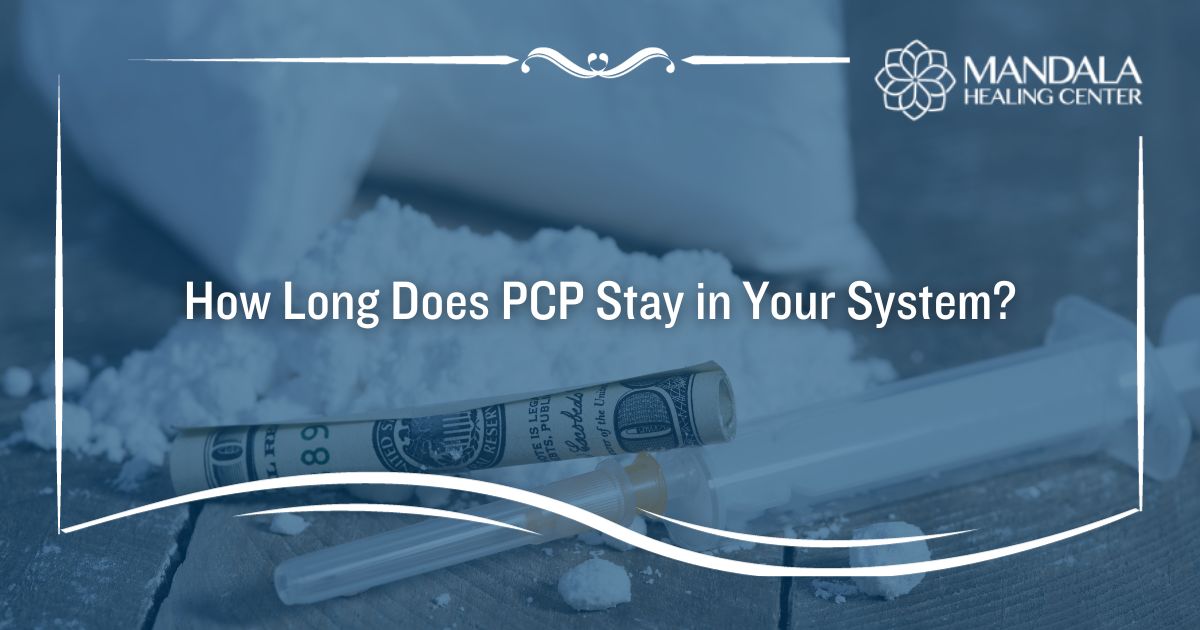Phencyclidine (PCP), also known as angel dust, is a dissociative anesthetic drug, which means it can produce out-of-body experiences and hallucinations. This substance is not used medicinally because of the risk of dependency and addiction. On the street, PCP can be found as a white powder or a liquid.[1]
According to the DEA, 52,000 people reported using PCP for the first time in 2020.[2]
When someone abuses PCP, they might snort, inject, smoke, or swallow it. Any form of PCP use is considered dangerous because of the many side effects it can cause. For example, some people believe they have superhuman strength and are not afraid of anything when they use phencyclidine, putting them at risk of bodily harm.
If you or a loved one abuse PCP, you might be wondering how long it stays in your system. For most people, PCP stays in urine for 2-3 days after the last use.
What are the Effects of Phencyclidine (PCP)?
Phencyclidine is a dissociative and hallucinogenic drug, meaning it can cause you to feel separated from your body and the world around you while causing you to experience tactile, auditory, or visual hallucinations.
How long it takes the effects to begin after consuming PCP depends on how you ingest it. For example, snorting or injecting the substance will cause the effects to begin more rapidly than swallowing or smoking it.
The common effects of PCP use include:[1]
- A feeling of floating
- Being disconnected from reality
- A rush of euphoria
- Feeling like your sense of thinking is extremely clear
- Believing you are invincible or have superhuman strength
- Numbness throughout the body
- Loss of coordination
- Increased heart rate, blood pressure, and body temperature
- Aggressive or violent behavior
- Extreme suspicion and paranoia
- Being unable to feel pain
In addition to these effects, swallowing a large amount of PCP can result in kidney failure, heart arrhythmias, muscle rigidity, seizures, and even death. As a result, anyone suffering from an addiction to the drug should seek professional help.
What Factors Affect How Long PCP Stays in Your Body?
It’s important to understand that several factors influence how long the substance remains in your body. For example, someone who uses a large dose of PCP will have it in their system longer than an individual who took a small dose.
Other factors that influence how long PCP stays in your system include:
- Dose
- Frequency of use
- How long you’ve been using PCP
- Rate of metabolism
- Overall health
- How much water and food you have consumed
- Whether you abused other substances
How Long Does PCP Remain in Your System?
Influencing factors aside, most people follow a similar timeline when it comes to how long PCP remains in their system.
First, the half-life of PCP is about 21 hours, which is how long it takes your body to remove half of a single dose of the substance.[3] Typically, it takes about 4 to 5 half-lives for a drug to be completely removed from your body. This means that it can take up to 4 days for phencyclidine to be eliminated from your system.
Another easy way to determine how long PCP stays in your body is to look at how long different drug tests can detect the substance.
Urine
Urine tests are the most popular type of drug test because they are minimally invasive and generally reliable. With that being said, urine tests can detect PCP in your body for 2-3 days to a week after your last dose.
Saliva
Saliva drug tests are not as common because they provide a shorter window of detection. However, these tests can detect PCP in your system for up to 3 days after your last use.
Blood
Blood tests are less common than urine drug tests because they are invasive. Sometimes, blood tests are used in hospital settings to determine whether a drug is responsible for your symptoms. With that being said, blood tests can detect PCP in your body for 24 to 48 hours after you last used it.
Hair
Lastly, hair tests provide the longest window of detection time. This type of drug test can detect any substance in your system (including PCP) for up to 3 months after you consumed the drug. However, these tests are not commonly used because they can be expensive to send off to the lab.
Find Help for PCP Abuse and Addiction
If you or a loved one suffer from an addiction to PCP, it’s time to seek help. Abusing this drug can lead to dangerous behavioral effects, health emergencies, and life-threatening overdoses. Thankfully, drug rehab programs like Mandala Healing Center can provide you with the support and tools you need to maintain long-term recovery.
To learn more about our addiction treatment programs, contact Mandala Healing Center today.
References:
- Medline Plus: Phencyclidine (PCP), Retrieved September 2023 From https://medlineplus.gov/ency/patientinstructions/000797.htm
- The Drug Enforcement Administration (DEA): Phencyclidine, Retrieved September 2023 From https://www.deadiversion.usdoj.gov/drug_chem_info/pcp.pdf
- The National Library of Medicine (NLM): Phencyclidine Toxicity, Retrieved September 2023 From https://www.ncbi.nlm.nih.gov/books/NBK507865/












